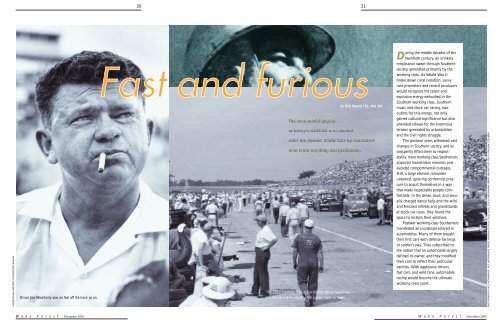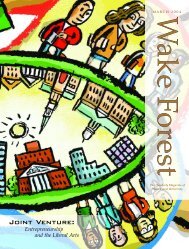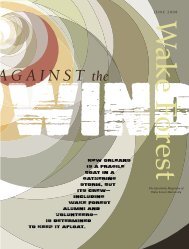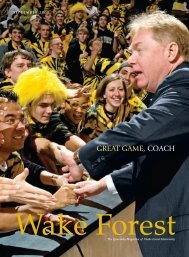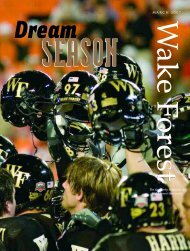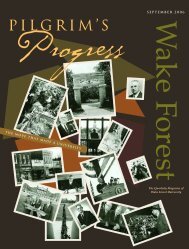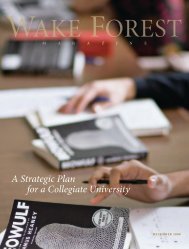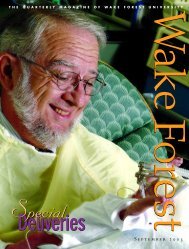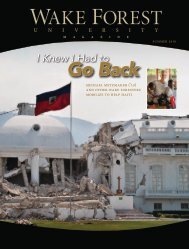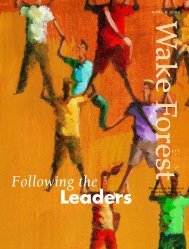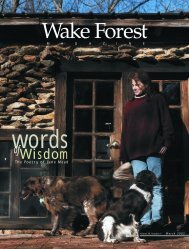Wake Forest Magazine December 2000 - Past Issues - Wake Forest ...
Wake Forest Magazine December 2000 - Past Issues - Wake Forest ...
Wake Forest Magazine December 2000 - Past Issues - Wake Forest ...
- No tags were found...
Create successful ePaper yourself
Turn your PDF publications into a flip-book with our unique Google optimized e-Paper software.
20<br />
21<br />
INTERNATIONAL SPEEDWAY CORPORATION/NASCAR<br />
Driver Joe Weatherly was as fast off the track as on.<br />
by Pete Daniel (’61, MA ’62)<br />
The commercial engine<br />
of today's NASCAR was started<br />
after the Second World War by characters<br />
who were anything but gentlemen.<br />
The 1950 Southern 500 at Darlingtom Motor Speedway—<br />
the first race at the South's first paved stock car track.<br />
During the middle decades of the<br />
twentieth century, an unlikely<br />
renaissance swept through Southern<br />
society, generated primarily by the<br />
working class. As World War II<br />
broke down rural isolation, savvy<br />
race promoters and record producers<br />
would recognize the talent and<br />
explosive energy embodied in the<br />
Southern working class. Southern<br />
music and stock car racing, two<br />
outlets for this energy, not only<br />
gained cultural significance but also<br />
provided release for the enormous<br />
tension generated by urbanization<br />
and the civil rights struggle.<br />
The postwar years witnessed vast<br />
changes in Southern society, and as<br />
prosperity lifted them to respectability,<br />
more working-class Southerners<br />
acquired mainstream manners and<br />
avoided comportmental outrages.<br />
Still, a large element remained<br />
untamed, ignoring conformist pressure<br />
to acquit themselves in a way<br />
that made respectable people comfortable.<br />
In the dense, loud, and sexually<br />
charged dance halls and the wild<br />
and frenzied infields and grandstands<br />
at stock car races, they found the<br />
space to reclaim their wildness.<br />
Postwar working-class Southerners<br />
manifested an inordinate interest in<br />
automobiles. Many of them bought<br />
their first cars with defense earnings<br />
or soldier’s pay. They subscribed to<br />
the notion that an automobile largely<br />
defined its owner, and they modified<br />
their cars to reflect their particular<br />
vanities. With aggressive drivers,<br />
fast cars, and wild fans, automobile<br />
racing would become the ultimate<br />
working-class sport.<br />
PHOTOGRAPHS BY W.D. WORKMAN JR.; W.D. WORKMAN JR. PAPERS, MODERN POLITICAL COLLECTIONS, SOUTH CAROLINIANA LIBRARY, UNIVERSITY OF SOUTH CAROLINA, COLUMBIA<br />
W a k e F o r e s t <strong>December</strong> <strong>2000</strong><br />
W a k e F o r e s t <strong>December</strong> <strong>2000</strong>


